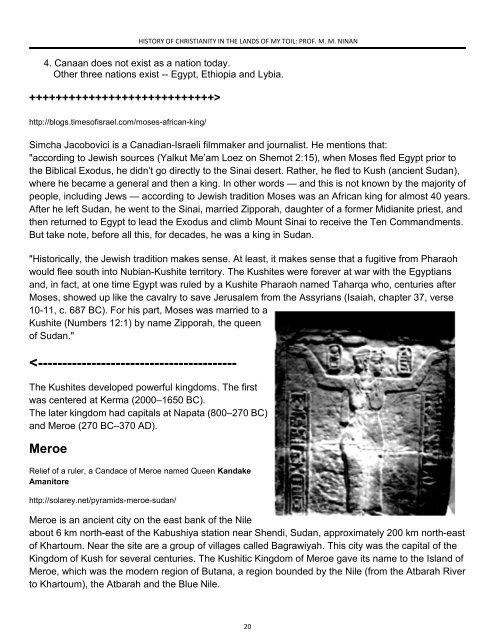Historyof Christianity in the lands of My Toil
You also want an ePaper? Increase the reach of your titles
YUMPU automatically turns print PDFs into web optimized ePapers that Google loves.
HISTORY OF CHRISTIANITY IN THE LANDS OF MY TOIL: PROF. M. M. NINAN<br />
4. Canaan does not exist as a nation today.<br />
O<strong>the</strong>r three nations exist -- Egypt, Ethiopia and Lybia.<br />
++++++++++++++++++++++++++++><br />
http://blogs.times<strong>of</strong>israel.com/moses-african-k<strong>in</strong>g/<br />
Simcha Jacobovici is a Canadian-Israeli filmmaker and journalist. He mentions that:<br />
"accord<strong>in</strong>g to Jewish sources (Yalkut Me’am Loez on Shemot 2:15), when Moses fled Egypt prior to<br />
<strong>the</strong> Biblical Exodus, he didn’t go directly to <strong>the</strong> S<strong>in</strong>ai desert. Ra<strong>the</strong>r, he fled to Kush (ancient Sudan),<br />
where he became a general and <strong>the</strong>n a k<strong>in</strong>g. In o<strong>the</strong>r words — and this is not known by <strong>the</strong> majority <strong>of</strong><br />
people, <strong>in</strong>clud<strong>in</strong>g Jews — accord<strong>in</strong>g to Jewish tradition Moses was an African k<strong>in</strong>g for almost 40 years.<br />
After he left Sudan, he went to <strong>the</strong> S<strong>in</strong>ai, married Zipporah, daughter <strong>of</strong> a former Midianite priest, and<br />
<strong>the</strong>n returned to Egypt to lead <strong>the</strong> Exodus and climb Mount S<strong>in</strong>ai to receive <strong>the</strong> Ten Commandments.<br />
But take note, before all this, for decades, he was a k<strong>in</strong>g <strong>in</strong> Sudan.<br />
"Historically, <strong>the</strong> Jewish tradition makes sense. At least, it makes sense that a fugitive from Pharaoh<br />
would flee south <strong>in</strong>to Nubian-Kushite territory. The Kushites were forever at war with <strong>the</strong> Egyptians<br />
and, <strong>in</strong> fact, at one time Egypt was ruled by a Kushite Pharaoh named Taharqa who, centuries after<br />
Moses, showed up like <strong>the</strong> cavalry to save Jerusalem from <strong>the</strong> Assyrians (Isaiah, chapter 37, verse<br />
10-11, c. 687 BC). For his part, Moses was married to a<br />
Kushite (Numbers 12:1) by name Zipporah, <strong>the</strong> queen<br />
<strong>of</strong> Sudan."<br />

















